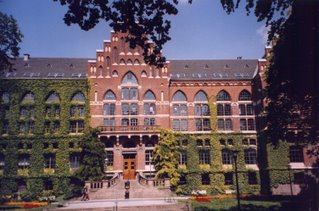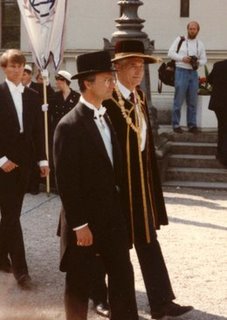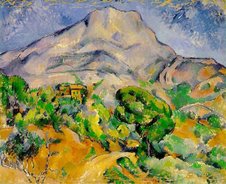
I was reading yesterday about a doctoral thesis that was examined under the most bizarre circumstances - within the confines of a jail. It's the latest twist in the saga of Nathalie Gettliffe, who is now, it seems, entititled to call herself Dr. Gettliffe. She's the French mother who's presently banged up in Canada, awaiting trial for abduction of her own children, back to France, some 5 years ago, and causing much handwringing and debate on another blog.
See the article in Canada's Globe&Mail, Fri Nov 3
For this blogger, it was impossible to read it without reminiscing about similar events in my own life (doctoral dissertations, not being banged up, I hasten to add). This being my personal space, I'll use today's post to talk about them. (Nobody's forcing you to read it, BT. But thanks for providing the above link. )
My own PhD was a typically British affair. You simply sat down for months on end, typing up your research findings, got them OK'd by your research supervisor, had them photocopied in quintuplicate, and then - the big day- lugged the whole lot along to a specialist binder. A week or two later - there they were, all converted into 5 fat doorstops, in this case blue-bound London University theses. And there, tempting fate, on the spine in gold were the words: C.S.Berry PhD 1975. How I celebrated that night to see a tangible end-result to all that drafting and re-drafting. At times, I had driven my dear wife to distraction (press-ganged as a reserve typist) with my habit for making last minute changes.
The real ordeal was still to come - the viva voce, or simply "viva". It was carried out in the Professor's office, just me, my supervisor, Terry Hallinan (RIP) who just for the day acquired the intimidating title "Internal Examiner" , and Professor Geoffrey Dutton, an expert in my field who had travelled all the way down from Dundee for the day. And who did not waste a minute, it seemed, of that long train journey, scrutinising closely every claim, every turn of phrase, every spelling of Scandinavian names. "It's Hänninan", he fumed. "He's a Finn for heaven's sake. His name is pronounced HENNINEN. So why have you put an umlaut over the "a" ? It should be two DOTS. See you get it corrected ! " I emerged a battered 3 hours later, but a PhD. Later I was to feel a lot more well-disposed to the inquisitor. He was to be the subject of a TV programme for his work in converting some windswept Scottish moorland into a Garden of Eden. It's all his book Some Branch against the Sky. If the title sounds poetic, it is, because he's also a poet among his many other accomplishments (mountaineering etc). I ran into him again, some 3 years later, on an internal flight in Finland. I was heading for Ivalo, two hundred miles north of the Arctic Circle, because I wanted to know what it was like, two hundred miles north of the Arctic Circle. Geoffrey, on the other hand, was getting off at Oulu, and heading for a famous national park, whose name I've forgotten, probably to pocket a few seeds for his conifer windbreaks. We were both in Finland for a conference, needless to say, hosted by the man with two dots over the first a in his name, and who subsequently made Geoffrey a visiting honorary professor at Kuopio University ! One day I'll do a post devoted entirely to Geoffrey Dutton, a truly remarkable man.
Some ten years later, I was an independent researcher at a food research institute, and had established a presence in a new area, namely resistant starch (RS) . RS is starch in a particular crystalline form that resists digestion in the small intestine, but can be metabolised by gut bacteria in the lower bowel. These days it's regarded as a prebiotic. Some think it might protect against bowel cancer. In 1986 I was the first to publish a paper devoted entirely to resistant starch, and briefly (all too briefly) had celebrity status. The Independent used its Monday Page 2 science slot to feature the work I was doing. Me, a Page 2 boy ! Yes, it's trumpet blowing, but a necessary antidote to some of the putdown remarks one gets on blogs from complete strangers, ones who know next to nothing of one's background or career, yet try to dismiss one as waste of space .
Some time in the late 80s, the phone rang, and on the other end was Nils Georg-Asp, a Professor of Food Science at the University of Lund in Sweden. Did I remember Monica Siljeström, he asked, because she had just completed her thesis, and he was looking for someone to examine it ? Yes, I did remember meeting her at conferences. We had both independently discovered that resistant starch is not a product of bread staling, as one or two cynics had tried to suggest. It's formed as soon as the bread comes out of the oven. So yes, I would be only too happy to oblige, especially as it would be an all-expenses- paid weekend in Lund, coinciding with a big academic festival at that ancient ivy-clad seat of learning ( see picture of the magnificent University library above) with the King in attendance.
I first flew to Copenhagen, and than jumped aboard the ferry that ran from the airport across the straits to Malmo in Sweden on the other side. There's now a magnificent bridge, one of the longest in Europe I believe. Nils was waiting for me, and explained how the system worked in
Sweden. My heart sank. I had only picked up on part of the story -the good part- over the phone, The good part was that in Scandinavia the thesis is a collection of bound published work. In other words, it has already been through peer-review. It is prefaced by about 20 or 30 pages of introduction and discussion - a far slimmer affair than the leaden British tome. The bad news ? My job was to act as a kind of public inquisitor. The viva would be held in a lecture theatre, with the candidate's entire department in attendance and also, wait for it, the candidate's Mum, Dad, brothers and sisters ........ I had not appreciated that the Scandinavian viva was seen as a somewhat traumatic rite of passage, a public spectacle no less.
Well, I coped, just, and so did the candidate. For an hour or so I pitched questions at her, wondering what Mum and Dad would make of words like retrogradation, crystallites, colonic microflora and so forth. Later I and the candidate's professors retired to a small room, where it was subtly signalled that Monica had passed, and all I needed to do was sign on the dotted line. As it happens, Monica had earned her doctorate for careful and methodical work, but I wonder to this day what the response would have been if this outsider had detected serious flaws ......
Yes, the King was in Lund that day, and housed in the very same hotel I was staying in. There were guards at the door, checking ID (I was given a special pass). Naturally, I popped down to the bar in the evening, hoping to chew the fat with His Maj, share a bag of crisps, and expecting to hear that you just can't get the subjects these days. But when I saw the price of beer in Sweden I beat a hasty retreat.








1 comment:
I was once asked to be the external examiner for a PhD as well.
It was a great honour and a pleasure to oblige, although the taxable fee of £80 was rather modest, equating as it did only to around £10 per kilogram of the mighty tome I was asked to read (and duly did read, honest).
It was a fine piece of work, as I recall, covering the geology of part of SW France, and it was rewarding to see that the student had asked the right questions in her work and made excellent progress in answering very many of them.
The internal examiner on that occasion was the same tutor who had been appointed for my own viva ten years before.
That made the day even more enjoyable, of course, not least since I could (confidentially) offer my condolences to the candidate later on, when my co-examiner asked for rectification of the same painstakingly minor reference protocol errors as he had to me ...
Post a Comment